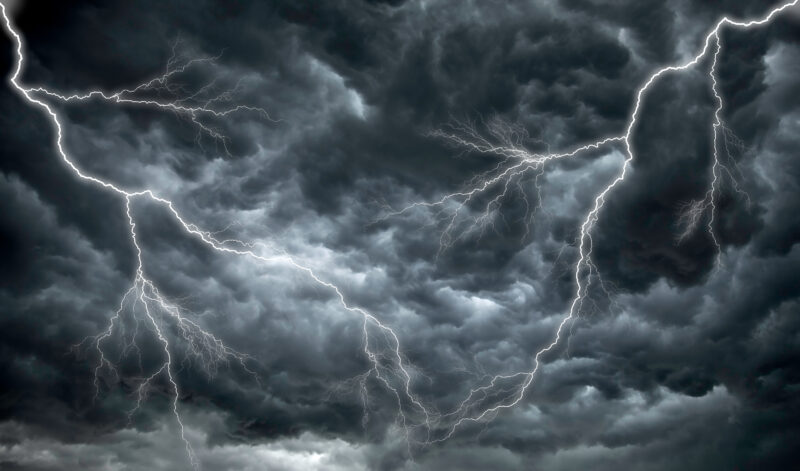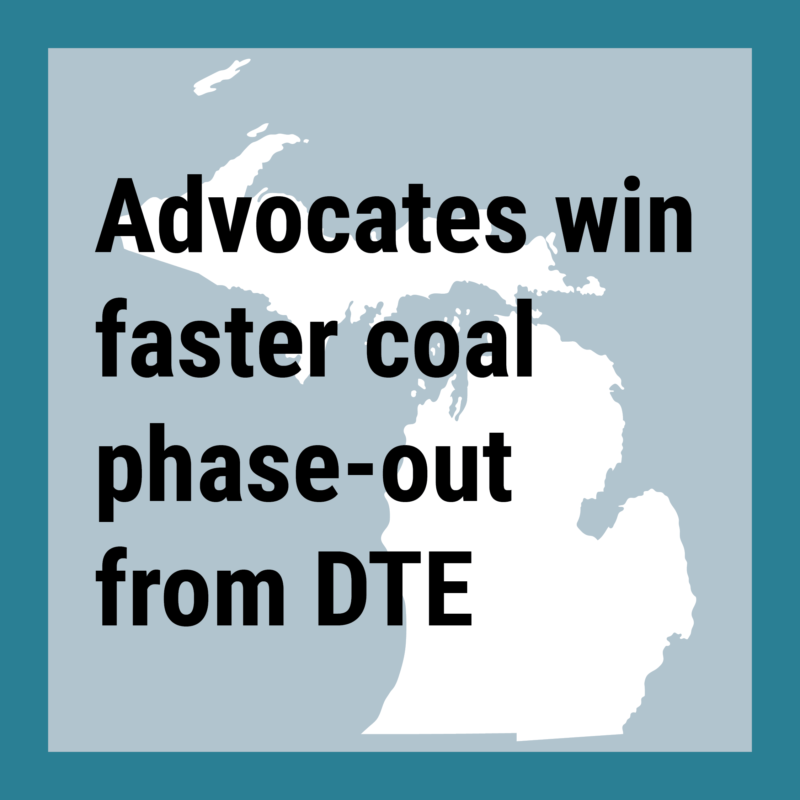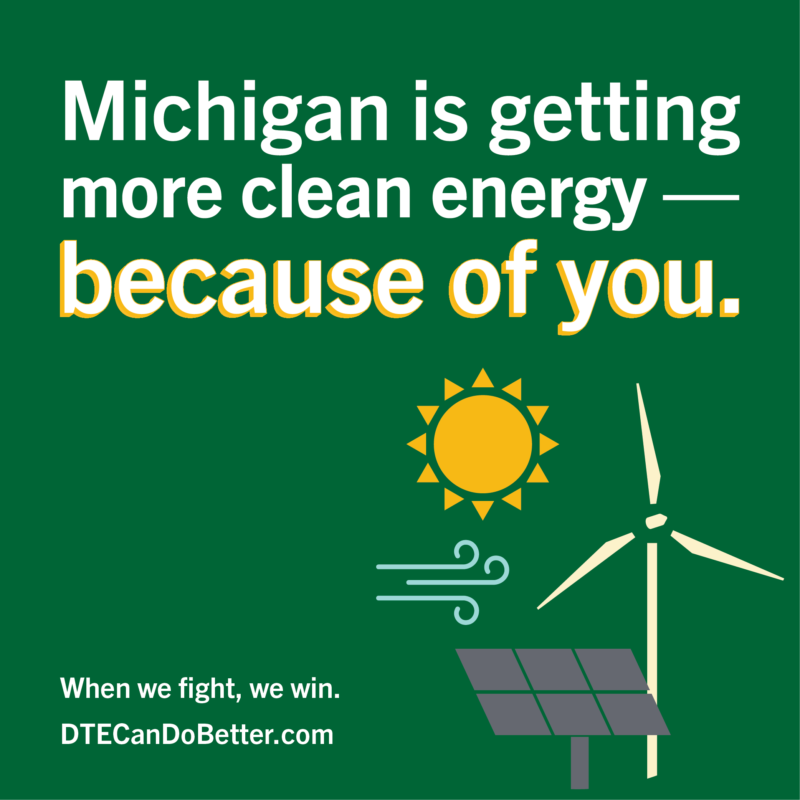FOR IMMEDIATE RELEASE: Wednesday, July 12, 2023
CONTACT: Stephanie Cepak, Byrum Fisk Advocacy Communications, scepak@byrumfisk.com
Advocates force pollution cuts, clean energy investments to help customers in DTE’s energy plan, amid continued push for increased accountability
Advocacy groups urge Michigan Public Service Commission to adopt settlement agreement and call on Legislature to expand oversight of utilities
DETROIT – DTE Energy will have to make greater investments in renewable energy, energy efficiency, and assistance to low-income ratepayers under a settlement agreement negotiated by a broad coalition of clean energy, environmental justice, and consumer advocacy organizations. The coalition has been advocating for DTE to prioritize environmental justice and energy equity in its long-term energy plan while retiring dirty fossil fuel plants and ending further investment in fossil fuels.
Coalition organizations across the state– We Want Green Too; Soulardarity; Michigan United; Michigan Environmental Justice Coalition; Michigan Alliance for Justice in Climate; NRDC (Natural Resources Defense Council); Sierra Club; Union of Concerned Scientists; Vote Solar; and the Michigan League of Conservation Voters – turned out hundreds of members of the public to speak out at public hearings and submitted thousands of comments to the MPSC. The sustained pressure, along with strong legal work and expert testimony before the Commission, persuaded the utility company to negotiate a settlement that secured an earlier retirement date for DTE’s Monroe coal plant.
Beyond DTE’s requirement to disclose political contributions, the utility will be required to file public disclosure reports annually that detail any contributions to individuals and other entities adding up to $5,000 or more. This is a significant win for the public after the company’s shareholders voted down a proposal to increase transparency around political contributions in May.
DTE’s original plan failed to keep energy bills affordable for ratepayers and ensure equitable access to clean energy, according to a recent analysis. With historic federal funding and incentives available, the coalition called on DTE to speed up funding and expand access to clean energy. The settlement requires DTE to pay $38 million into community-led programs to assist low-income customers, with $30 million allocated to energy assistance and $8 million to support organizations that will provide solar and battery installation, including funding for home repairs and energy efficiency needed to complete these upgrades. DTE will also be required to direct an additional $70 million in energy efficiency funding towards programs for income-qualified customers.
The settlement agreement will be submitted to the Michigan Public Service Commission (MPSC), which makes the final determination on DTE’s long-term plan to provide electricity for customers, called an Integrated Resource Plan. The MPSC next meets on July 26.
“Michigan’s dirty air woes are a stark reminder of the need for more clean energy in the state,” said Derrell Slaughter, MI clean energy advocate at NRDC (Natural Resources Defense Council). “The settlement agreement for energy efficiency, battery storage and cleaner technologies will clearly benefit the health of customers by cutting dangerous air pollution. The recommendations are a win for Michiganders, but it’s not enough. The Legislature must act swiftly and decisively on climate and clean energy legislation. The time for action is now, and together, we can make a lasting difference for generations to come.”
“DTE’s plan will have to prioritize BIPOC and low-income communities that have suffered the devastating public health impacts from pollution and the climate crisis first and worst,” said Gloria Lowe, Founder and CEO of We Want Green Too. “Multiple recent outages show we must take swift action to slow climate change to avoid even worse storms and heat waves in the future. Just last year, Consumers Energy agreed to go coal-free by 2025 and while DTE will retire its Monroe coal plant earlier than scheduled, operating it until 2032 and the utility’s reliance on fracked gas continues to be problematic. We’ll continue fighting to end the use of fossil fuels in Michigan to protect the health and environment of our communities.”
“This settlement is a step in the right direction and it only happened due to advocacy from organizations across the state who intervened, got ratepayers involved and put the big energy utility’s feet to the fire,” said Nick Dodge, communications director for the Michigan League of Conservation Voters. “We have unprecedented amounts of federal funds available to make investments in clean energy, energy efficiency and to lower costs for ratepayers. Members of the Legislature should now look to pass clean energy legislation that empowers the Michigan Public Service Commission to further hold utility companies accountable, seizing this moment to transition to cleaner, more affordable energy.”
“DTE has long been a roadblock in our fight to expand community-based and rooftop solar. We need energy independence to protect us from DTE’s high rates and continual power outages. The settlement agreement will allow more people to install rooftop solar and require the utility to provide funding for community-based organizations to provide solar and battery installation for low-income customers.” said Rafael Mojica, Program Director at Soulardarity. “This is a win, but DTE shouldn’t get to decide how many customers can provide their own energy. It’s time for the legislature to take action so we don’t have to rely on the utilities to make decisions for us.”
Sierra Club’s Michigan Field Manager, Andrew Sarpolis, said, “DTE’s Monroe coal plant is a massive air polluter, impacting public health and our climate in Michigan. Every additional year of its operation exacerbates climate change and harms our communities. By retiring the plant sooner, we can have a greater positive impact on the state’s health and climate.”
###








